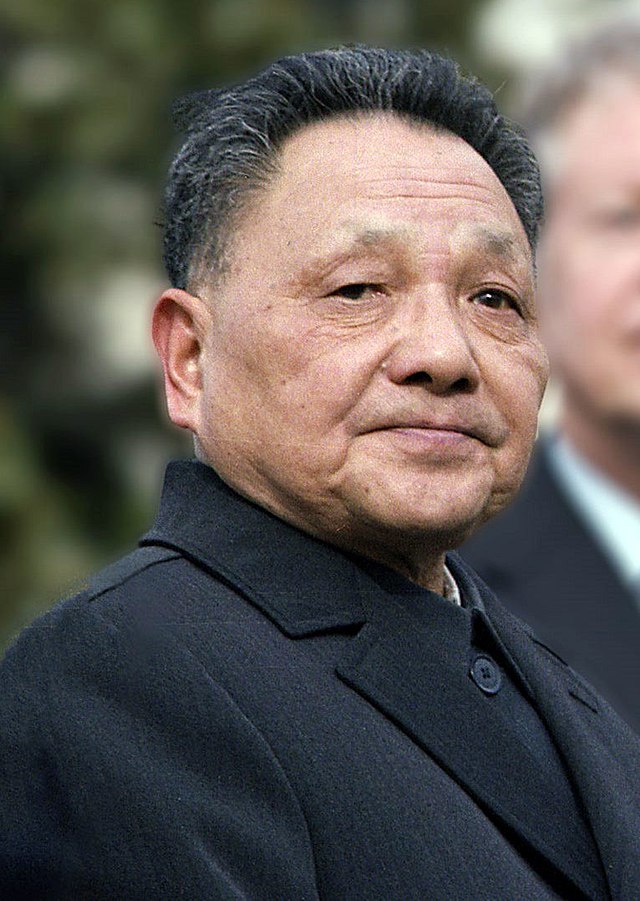Deng Xiaoping: Difference between revisions - Wikipedia
 Article Images
Article Images
Content deleted Content added
Tags: canned edit summary Mobile edit Mobile app edit Android app edit App section source |
m Tags: canned edit summary Mobile edit Mobile app edit Android app edit App section source |
||
Line 166: }} '''Deng Xiaoping''' ({{zh|s=邓小平}}{{efn|{{IPAc-en|ˈ|d|ʌ|ŋ|_|ʃ|aʊ|ˈ|p|ɪ|ŋ}}, {{IPAc-en|alsoUK|ˈ|d|ɛ|ŋ|_|-|,_|-|_|ˈ|s|j|aʊ|p|ɪ|ŋ}};<ref>{{Cite web |title=Deng Xiaoping |url=https://www.collinsdictionary.com/amp/english/deng-xiaoping |url-status=live |archive-url=https://web.archive.org/web/20190604031142/https://www.collinsdictionary.com/amp/english/deng-xiaoping |archive-date=4 June 2019 |access-date=8 March 2019 |website=[[Collins English Dictionary]] |publisher=[[HarperCollins]]}}</ref><ref>{{Cite web |title=Deng Xiaoping |url=https://en.oxforddictionaries.com/definition/us/deng_xiaoping |url-status=dead |archive-url=https://web.archive.org/web/20190604031146/https://en.oxforddictionaries.com/definition/us/deng_xiaoping |archive-date=4 June 2019}} (US) and {{Cite encyclopedia |url=http://www.lexico.com/definition/Deng+Xiaoping |archive-url=https://web.archive.org/web/20190308000000/http://www.lexico.com/definition/Deng+Xiaoping |url-status=dead |archive-date=2019-03-08 |title=Deng Xiaoping |dictionary=[[Lexico|Oxford Dictionaries]] UK English Dictionary |publisher=[[Oxford University Press]]}}</ref><ref>{{Cite Merriam-Webster|Teng Hsiao-p'ing |access-date=8 March 2019}}</ref> {{lang-zh|s=邓小平|t=|p=Dèng Xiǎopíng}}; also [[Romanization of Chinese|romanised]] traditionally as '''Teng Hsiao-p'ing''';<ref>{{Cite web |date=August 1976 |title=Mao's last hurrah: the campaign against Teng Hsiao-Ping |url=https://www.cia.gov/readingroom/docs/CIA-RDP79T00889A000800030001-8.pdf |archive-url=https://web.archive.org/web/20210413100236/https://www.cia.gov/readingroom/docs/CIA-RDP79T00889A000800030001-8.pdf |archive-date=13 April 2021 |website=[[CIA]]}}</ref> born '''Xiansheng''' ({{lang|zh|先圣}}). {{Family name explanation|[[Deng (Chinese surname)|Deng]]|lang=Chinese}}}}; 22 August 1904 – 19 February 1997) was a Chinese Born in [[Sichuan]] near the end of the [[Qing dynasty]], Deng went to France in 1921 on a [[Diligent Work-Frugal Study Movement|work-study program]] that placed students in factory jobs; seeing working conditions he became attracted to [[Marxism–Leninism|the theories]] of [[Vladimir Lenin]], and in 1924 he joined the CCP. In early 1926, Deng travelled to Moscow to study political science, becoming a [[political commissar|commissar]] for the [[Chinese Red Army|Red Army]] upon his return to China. Near the end of 1929, Deng led local Red Army uprisings in [[Guangxi]]. In 1931, he was demoted within because of his support for Mao, but was again promoted during the [[Zunyi Conference]]. Deng was an important figure throughout the [[Chinese Civil War]] (1927–1949), including during the [[Long March]] (1934–1935) and in fighting against [[Second Sino-Japanese War|the Japanese]] (1937–1945). He, [[Liu Bocheng]] and [[Chen Yi (marshal)|Chen Yi]] led the newly formed [[People's Liberation Army]] (PLA) into the former [[Kuomintang]] capital of [[Nanjing]] during the final stretch of the civil war. | |||